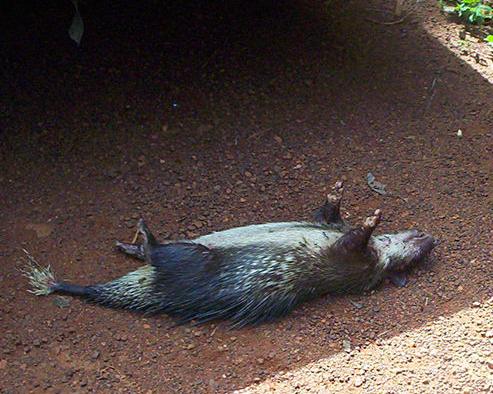Bushmeat black market thrives in Paris
By Genevieve Oger It's Friday night in one of Paris's many African restaurants, but thirty-something Congolese immigrant Roger won't be having anything listed on the menu. He called ahead to arrange a special order — porcupine in a black sauce, with a side of cassava. At 34 dollars, the porcupine dish is twice the price of regular menu items. But Roger says it's worth it. He says eating French food seems like eating the same thing all week. "You can't make the difference between fish or chicken or beef," Roger says. "But in Africa, you can make the difference between porcupine, snake, crocodile. All animals have got a unique taste." Roger says he eats what's known as bushmeat twice a week – that is, animals killed in the wild from his home continent. His favorites are porcupine, snake and the anteater-like pangolin. The three animals are among a dozen species that are commonly smuggled into France to cater to the country's African community. The meat often ends up for sale at the African market, near Chateau Rouge metro station, where bushmeat is hawked by illegal vendors who sell only a small number of items from bags or baskets. The bushmeat is generally hidden from view. You have to ask for it, and have an African face to get any kind of positive response. Street sellers risk a fine of up to 100 thousand dollars and four years in jail for selling illegal bushmeat. Not everything considered bushmeat is illegal in France. But the illegal market is big enough that it worries French authorities. Paris health inspector Serge Hauteville, whose beat is the 18th arrondissement, the heart of the city's African community, says it's a problem because the products often don't live up to European health standards. In particular, health officials worry the animals aren't killed or transported in hygienic conditions. Environmentalists, meanwhile, have their own concerns. A 2010 study by scientists from the Zoological Society of London, and published in the journal Conservation Letters, monitored seizures of illegal African bushmeat at Paris's Charles de Gaulle airport over a three-week period. Based on the results, the researchers estimated that more than five metric tons of African bushmeat is smuggled through that one airport every week, or 260 tons a year. None of the meat seized during that period was from threatened or endangered species, but the authors argue that this traffic still poses a threat. Zoologist Marcus Rowcliffe is worried about the potential conservation impact. In other parts of the world, Rowcliff says, very vulnerable species have become luxury food items, with high prices driving extremely unsustainable hunting. Rowcliffe says that hasn't happened with any of the species most commonly smuggled into Paris, but he adds that even if the animals aren't yet endangered, hunting them can harm local ecosystems because the animals play an important role in dispersing seeds and controlling insects. Still, the African bushmeat trade here in Paris likely represents just a tiny fraction of all of the wild animals killed for meat in Central and West Africa every year. And not all conservationists see the European smuggling as a major concern. Veterinarian Phillipe Chardonnet, head of the International Foundation for Fauna Management, points out that millions of Africans rely on bushmeat for protein. Chardonnet says most of the animals hunted–species like porcupines and cane rats–are plentiful and can sustain hunting pressure. Often, he says, farmers, government authorities and development agencies consider them pests. Chardonnet's organization, which promotes wildlife conservation and sustainable hunting, does supports some anti-bushmeat initiatives, especially for apes and other protected species. But he says for them to work, the efforts must be associated with positive measures that involve local communities. "You have to have people on your side," Chradonnet says. "You must understand their livelihood, their culture, and their taste for wild meat." Chardonnet acknowledges that the smuggling of some of this wild meat in France does carry health concerns. But he says the relative quantities are too small to make it a serious issue. And it seems likely that the illegal African bushmeat trade won't end any time soon. Health inspectors say it's so well-hidden that they rarely find any on their searches. Meanwhile French customs don't even mention the issue in their most recent annual report, and declined interview requests. Bushmeat smuggling has little economic impact, so it's just not a priority. Meanwhile Roger, the Congolese aficionado, says bushmeat is far too important to his culture to leave it behind. He says he trusts hunters back home to use their ancestral knowledge to manage their forest animals sustainably. And as long as he can find it, he'll continue to buy bushmeat here in France.
Our coverage reaches millions each week, but only a small fraction of listeners contribute to sustain our program. We still need 224 more people to donate $100 or $10/monthly to unlock our $67,000 match. Will you help us get there today?
